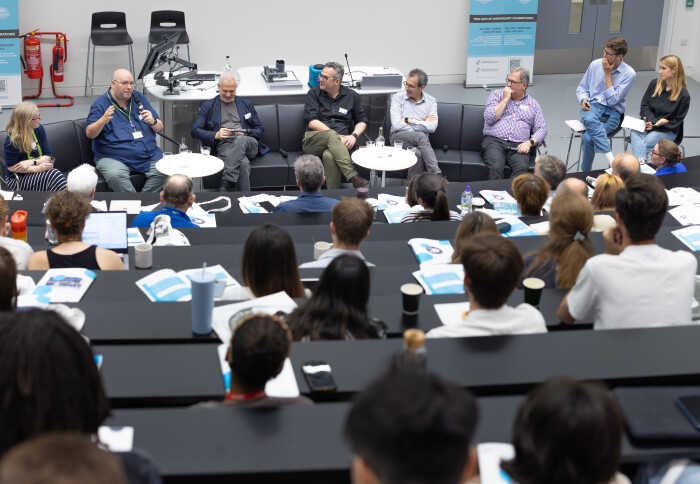ICB CDT: How did we get here and where are we going?

Panel Discussion from our 20th Anniversary Celebrations
With our recent renewal, this is an excellent opportunity to reflect upon 20 transformative years for the Chemical Biology community at Imperial.
The seeds that led to the creation of the ICB (formerly known as the Chemical Biology Centre, CBC), were planted by a group of academics led by Professors David Klug and Richard Templer. The multidisciplinary centre they established with colleagues from across Imperial College, focussed upon developing novel molecular tools and technologies to solve challenges in the biological and biomedical sciences.
Over the past 20 years the ICB has been instrumental in bringing together researchers from different disciplines and sectors to tackle and solve a broad range of problems at the interface between physical and life sciences. The ICB has grown steadily year on year expanding not only the expertise of its community but also the scope of its research. Currently, the ICB brings together over 165 research groups, from 20 different departments and centres and 65 external partners. Since first established in 2003, the ICB has trained over 400 PhD students, tackling problems that range from a fundamental nature, to those of importance to the pharmaceutical, agrisciences and personal care industrial sectors.
The ICB has led on several multimillion-pound initiatives (funded by Research Councils, European Commission and industry) including program and platform grants and most recently the renewal of the ICB EPSRC CDT: Empowering UK BioTech Innovation with £26M cash and in-kind funding to support over 100 PhD studentships.
The success of these initiatives has been the ability to rapidly bring together tens of researchers and PhD students from different disciplines and sectors, to focus their efforts for a few years to solve a particular set of challenges / questions. The ICB's ability to build communities to tackle multidisciplinary challenges, has also provided the platform for other initiatives to grow and set up new centres and networks such as the Drug Discovery Sciences Centre and Hub, FabriCELL and the AgriFutures lab amongst others.
The 'beating heart' of the ICB from its inception, has been its commitment to train the next generation of physical scientists with the ability to apply their knowledge to study and solve problems in the biological sciences. One of the first activities to realise this aim, was to establish a Masters in Research (MRes) course in Biomolecular Sciences jointly between the Departments of Chemistry and Life Sciences. This unconventional course, when first set up, led to a number of very successful postgraduate training programmes, with its flagship being the ICB CDT. Our CDT was one of the first to be funded by the EPSRC and is the longest running CDT in the UK.
"Suddenly leading players in pharma and biotech, who believed in this new way of working, were embedding themselves at the heart of the ICB. They seeded it with exciting challenges that could only be tackled with multidisciplinary approaches." Prof Oscar Ces Director of the ICB CDT 2009–23, Director of the ICB 2014-20
It completely changed the way that PhD training was structured, not only ensuring that students are equipped with the language, skills and knowledge to tackle some of the most challenging science at the interface between the physical and life sciences, but also recognising the importance of science communication, creativity, innovation, responsible research, human centred design, translation and entrepreneurship in a PhD student's portfolio. This enables the training of the next generation of leaders and has resulted in >90% of our students remaining in science on completion of their PhD. In addition, it pioneered the model of co-funding studentships ensuring that research within the CDT was aligned and in lockstep with the needs of industry and SMEs.
One of the key drivers to the success of the CDT is our community which continues to grow. It includes academics and students both at Imperial and across the world, as well as partners from global companies, SMEs, and civic organisations that span Healthcare & Therapeutics, Personal Care, Agri-Science and Bio/Med-Tech sectors. These partnerships stimulate exciting avenues of research and also ensure that our training meets the needs of future employers.
Our CDT PhD training continuously evolves to ensure that we are equipping our students for future challenges. The renewed CDT is putting Lab of the Future platforms at the heart of it’s remit; dovetailing industry 4.0/5.0 breakthroughs in automation and robotics, Internet of Things, curated data ecosystems, Artificial Intelligence and Machine Learning with the creation of cutting-edge molecular tools and technologies will redefine the state of the art with respect to making, measuring, modelling & manipulating molecular interactions in biological systems. It will promote efficient and rapid design-test cycles and drive environmental, social and economic sustainability.
We are so proud of all the ICB community's achievements over the past 20 years and are very excited to see what the future will bring. This includes continuing to stimulate the growth of one of the fastest expanding Life-Science districts in Europe, the White City Innovation District (WCID), that is already home to 100s of SMEs. In the years to come, working closely with our partners, the ICB and its CDT will play a pivotal local and national role in economic development supporting UK plc.
Article text (excluding photos or graphics) © Imperial College London.
Photos and graphics subject to third party copyright used with permission or © Imperial College London.
Reporter
Hannah Cameron
Department of Chemistry